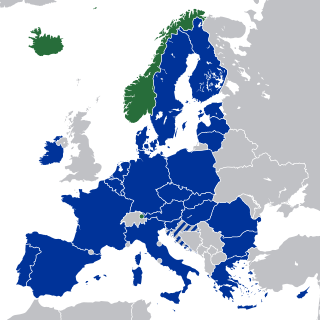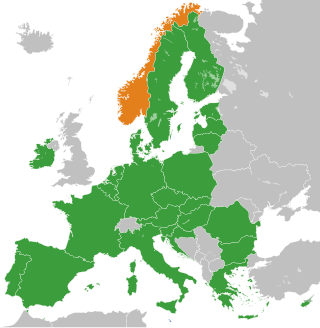Related Research Articles

The European Free Trade Association (EFTA) is a regional trade organization and free trade area consisting of four European states: Iceland, Liechtenstein, Norway and Switzerland. The organization operates in parallel with the European Union (EU), and all four member states participate in the European single market and are part of the Schengen Area. They are not, however, party to the European Union Customs Union.

The European Economic Area (EEA) was established via the Agreement on the European Economic Area, an international agreement which enables the extension of the European Union's single market to member states of the European Free Trade Association (EFTA). The EEA links the EU member states and three of the four EFTA states into an internal market governed by the same basic rules. These rules aim to enable free movement of persons, goods, services, and capital within the European single market, including the freedom to choose residence in any country within this area. The EEA was established on 1 January 1994 upon entry into force of the EEA Agreement. The contracting parties are the EU, its member states, and Iceland, Liechtenstein, and Norway. New members of EFTA would not automatically become party to the EEA Agreement, as each EFTA State decides on its own whether it applies to be party to the EEA Agreement or not. According to Article 128 of the EEA Agreement, "any European State becoming a member of the Community shall, and the Swiss Confederation or any European State becoming a member of EFTA may, apply to become a party to this Agreement. It shall address its application to the EEA Council." EFTA does not envisage political integration. It does not issue legislation, nor does it establish a customs union. Schengen is not a part of the EEA Agreement. However, all of the four EFTA States participate in Schengen and Dublin through bilateral agreements. They all apply the provisions of the relevant Acquis.
The General Confederation of Labor - Workers' Force, is one of the five major union confederations in France. In terms of following, it is the third behind the CGT and the CFDT.

The Swedish Trade Union Confederation, commonly referred to as LO, is a national trade union centre, an umbrella organisation for fourteen Swedish trade unions that organise mainly "blue-collar" workers. The Confederation, which gathers around 1.5 million employees out of Sweden's 10 million people population, was founded in 1898 by blue-collar unions on the initiative of the 1897 Scandinavian Labour Congress and the Swedish Social Democratic Party, which almost exclusively was made up by trade unions. In 2019 union density of Swedish blue-collar workers was 60%, a decline by seventeen percentage points since 2006 when blue-collar union density was 77%. A strong contributing factor was the considerably raised fees to union unemployment funds in January 2007 made by the new centre-right government.
Same-sex marriage has been legal in Denmark since 15 June 2012. A bill for the legalization of same-sex marriages was introduced by the Thorning-Schmidt I Cabinet, and approved by the Folketing on 7 June 2012. It received royal assent by Queen Margrethe II on 12 June and took effect three days later. Polling indicates that a significant majority of Danes support the legal recognition of same-sex marriage. Denmark was the fourth Nordic country, after Norway, Sweden and Iceland, the eighth in Europe and the eleventh in the world to legalize same-sex marriage. It was the first country in the world to enact registered partnerships, which provided same-sex couples with almost all of the rights and benefits of marriage, in 1989.

Norway is not a member state of the European Union (EU). However, it is associated with the Union through its membership in the European Economic Area (EEA), signed in 1992 and established in 1994. Norway was a founding member of the European Free Trade Association (EFTA) in 1960, which was originally set up as an alternative to the European Economic Community (EEC), the main predecessor of the EU. Norway had considered joining both the EEC and the European Union, but opted to decline following referendums in 1972 and 1994. According to the European Social Survey conducted in 2018, 73.6% of Norwegians would vote 'No' in a referendum to join the European Union. Norway shares land borders with two EU member states, namely Finland and Sweden, and maritime borders with a third, Denmark.

The FOA is a trade union representing public sector workers in Denmark.
The United Federation of Trade Unions is a general union in Norway. With a membership of 150,000 it is the largest private sector union in the country.

The Norwegian Union of General Workers is a trade union in Norway. It has a membership of 33,000 and is affiliated with the Norwegian Confederation of Trade Unions (LO).

The Norwegian Union of Food, Beverage and Allied Workers is a trade union in Norway.

The Norwegian Syndicalist Federation is an anarcho-syndicalist group in Norway. Established in the 1910s, the NSF worked within existing Norwegian trade unions in order to radicalise them towards revolutionary syndicalism. It was a founding member of the International Workers' Association (IWA) and historically maintained close connections with the Central Organisation of Swedish Workers (SAC). The NSF was politically repressed during the German occupation of Norway and, in the wake of World War II, experienced a dramatic decline. In the 1970s, the organisation was reconstituted as a propaganda group and continued its activities into the 21st century, with a much smaller membership.
The Norwegian Farmers and Smallholders Union is an interest organization for farmers in Norway.

LO Stat is one of two bargaining structures within the Norwegian Confederation of Trade Unions (LO). LO Stat is the counterpart in negotiations over state employees' wages and conditions with the government and the employer's organisation, Spekter.
The Campaign for the Welfare State is a progressive public policy advocacy organization and think tank in Norway, founded in 1999 by six trade unions to promote the welfare state as a political system and associated policies, and to oppose economic liberalism and privatization and strengthen democratic control of the society's resources in particular. It is a broad alliance of 23 trade unions and other organizations representing 1 million members. Its director is Asbjørn Wahl. The organization organizes the annual Welfare Conference (Velferdskonferansen). Its offices are housed by the Norwegian Union of Municipal and General Employees.

Industri Energi is a Norwegian trade union for employees in the petroleum industry, the chemical industry, the pharmaceutical industry, the aluminium and metal industry and the forest industry.

The Left Party is a socialist political party in Sweden. On economic issues, the party opposes privatizations and advocates for increased public expenditures. In foreign policy, the party is Eurosceptic, being critical of the European Union and opposing Sweden’s entry into the eurozone. It attempted to get Sweden to join the Non-Aligned Movement in 1980, but did not succeed. The party is eco-socialist, and supports republicanism. It stands on the left wing of the political spectrum.

The Norwegian Social Workers' Union was a trade union representing social workers and those in related jobs in Norway.
The Norwegian Union of Child Welfare Educators was a trade union in Norway.
The Norwegian Nurses' Union was a trade union representing nurses working with people with learning disabilities in Norway.
Creo is a trade union representing workers in the art sector in Norway.
References
- ↑ "Historie om Fellesorganisasjonen (FO)". FO. Retrieved 19 November 2020.
- ↑ "Fellesorganisasjonen". Store Norske Leksikon. Retrieved 19 November 2020.
- ↑ "03546: Hovudsamanslutningane for arbeidstakarar og andre landsomfattande arbeidstakarorganisasjonar. Medlemer per 31. desember, etter Landsforening, statistikkvariabel og år". Statistics Norway. Retrieved 6 November 2020.